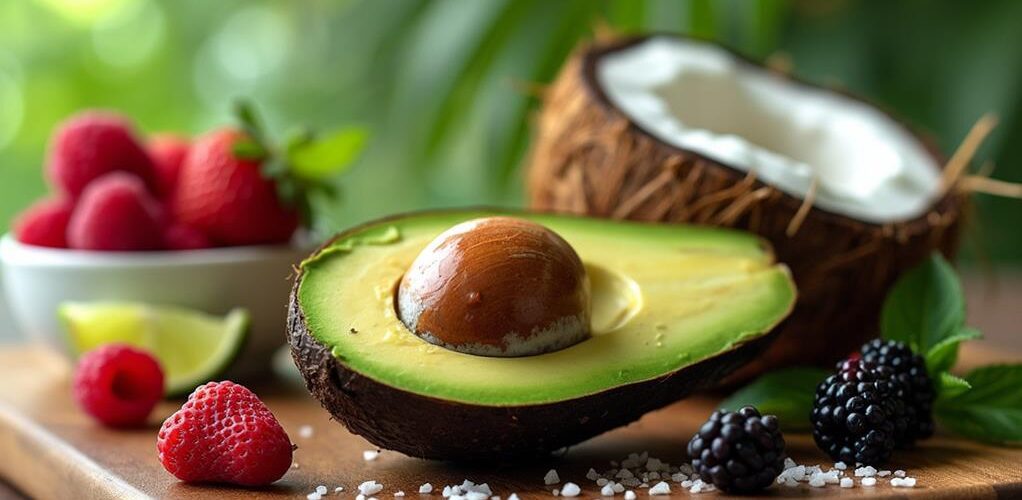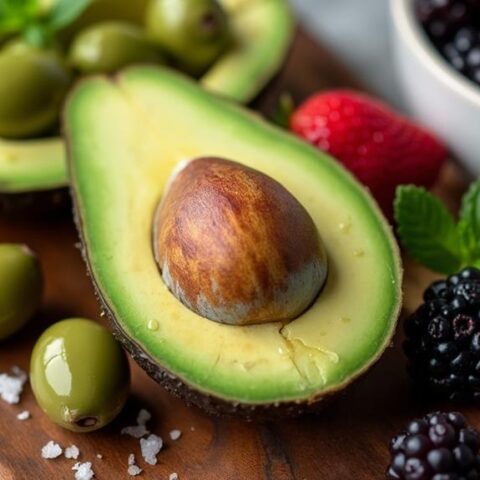
The ketogenic diet can be enhanced with select fruits that are low in carbohydrates yet rich in nutrients. Avocados are an excellent choice, providing heart-healthy fats and potassium. Strawberries and raspberries are beneficial for their low sugar content and high antioxidant levels. Lemons add flavor while offering a good dose of vitamin C, promoting immune function. Finally, tomatoes, with their lycopene content, support heart health and bring versatility to meals. These fruits contribute to digestive health and satiety due to their fiber content, making them suitable for keto followers. Continue exploring to uncover the multifaceted benefits of these fruits.
Key Takeaways
- Avocados are high in healthy fats and have only 1.5 grams of net carbs per 100 grams.
- Strawberries offer 8.7 grams of net carbs per cup and are rich in vitamin C and antioxidants.
- Raspberries contain 7 grams of net carbs per cup and provide significant fiber and antioxidants.
- Olives are low in carbohydrates and high in monounsaturated fats, making them a keto-friendly snack.
- Tomatoes have 3.3 grams of net carbs per medium tomato and are rich in lycopene for heart health.
Avocado Benefits
Although often categorized as a fruit, avocados stand out in the keto community due to their exceptional nutritional profile that is particularly conducive to a low-carbohydrate lifestyle.
With approximately 8.5 grams of carbohydrates per 100-gram serving and nearly 7 grams of fiber, the resulting net carb count is a mere 1.5 grams, making avocados an ideal choice for ketogenic diets. This low net carb content is complemented by a wealth of heart-healthy monounsaturated fats, which have been shown to improve cholesterol levels and support cardiovascular health.
Additionally, avocados are similar to nutrient-dense vegetables like spinach and kale, offering a range of essential nutrients without disrupting ketosis. In addition to their favorable macronutrient composition, avocados are nutrient-dense, offering essential micronutrients such as potassium, vitamin K, vitamin E, and vitamin C.
Potassium content, approximately 485 mg per fruit, is particularly significant for its role in maintaining electrolyte balance, an essential factor in ketogenic diets. Furthermore, the high fiber content aids digestion, promotes satiety, and helps maintain steady blood sugar levels.
Incorporating avocados into meals not only enhances flavor and texture but also introduces a versatile ingredient to various avocado recipes. Consequently, avocados serve as a nutrient-rich, satisfying, and beneficial component of a well-formulated ketogenic dietary regimen.
Strawberries on Keto
Avocados are not the only fruits that can fit seamlessly into a ketogenic dietary plan; strawberries also hold promise for those pursuing low-carb nutrition. With approximately 11.7 grams of carbohydrates per cup, strawberries are considered a low-carb fruit option suitable for the ketogenic diet. The net carbohydrate content, after accounting for roughly 3 grams of fiber, amounts to 8.7 grams per cup. This is conducive to maintaining ketosis, a metabolic state essential for those on a keto diet.
Additionally, strawberries can contribute to improved insulin sensitivity, which is vital for individuals managing type 2 diabetes. Incorporating strawberries into your diet can be beneficial:
- Strawberry smoothies can provide a rejuvenating, nutrient-rich beverage with minimal impact on carb intake.
- The fruit's 84.7 mg of vitamin C per cup supports immune function.
- Strawberries' manganese content, approximately 0.6 mg per cup, aids in bone health and metabolic processes.
- Antioxidants like anthocyanins present in strawberries offer potential anti-inflammatory benefits.
- Strawberry desserts can be crafted to satisfy sweet cravings while adhering to dietary restrictions.
These attributes make strawberries a versatile component of keto-friendly recipes, such as strawberry smoothies and strawberry desserts, offering both nutritional benefits and culinary satisfaction.
As always, portion control remains essential to aligning with ketogenic goals.
Raspberries for Fiber
In the domain of keto-friendly fruits, raspberries emerge as a particularly valuable choice due to their high fiber content and low net carbohydrate count. With approximately 15 grams of total carbohydrates per cup, raspberries offer an important 8 grams of fiber, resulting in a net carb count of only 7 grams. This makes them an excellent option for individuals adhering to a ketogenic diet.
Furthermore, the fiber benefits extend beyond carbohydrate management; it aids digestion and promotes satiety, which can be particularly advantageous for those seeking to maintain or lose weight while on keto. In addition to these benefits, the ketogenic diet is known to enhance metabolic health by improving fat metabolism and regulating appetite hormones.
Additionally, raspberries are a rich source of antioxidants, including quercetin and ellagic acid, which are known for their potential to mitigate inflammation and oxidative stress. Including just a cup of raspberries can contribute to approximately 32% of the recommended daily fiber intake, highlighting their nutritional importance.
The sweet-tart flavor of raspberries makes them a versatile addition to various raspberry recipes, enhancing smoothies, desserts, and more, without greatly impacting carbohydrate levels. This adaptability, combined with their health benefits, underscores the value of raspberries as a keto-friendly fruit choice, supporting both dietary goals and overall well-being.
Lemon Uses and Benefits
Raspberries showcase numerous nutritional benefits, but they are not the only fruit that aligns well with a ketogenic lifestyle. Lemons are an excellent addition to a keto-friendly diet due to their low carbohydrate content, with approximately 5.5 grams of carbs and 1.5 grams of dietary fiber per medium lemon. This makes them a practical choice for those adhering to carbohydrate restrictions while reaping significant health benefits.
Moreover, like some keto-friendly dairy options, lemons provide a variety of health advantages without disrupting ketosis. Lemons are rich in vitamin C, providing about 31% of the daily recommended intake per fruit, which is essential for immune support and maintaining skin health. The presence of citric acid enhances the absorption of minerals such as iron, thereby supporting ideal nutrition.
Lemon juice serves as a natural flavor enhancer, infusing dishes with acidity and brightness without adding substantial carbs. Additionally, the integration of lemon zest in culinary applications offers:
- Antioxidants: Flavonoids present in the zest have potential anti-inflammatory effects.
- Enhanced flavor: An aromatic boost without extra carbs.
- Versatility: Suitable for both savory and sweet dishes.
- Nutritional benefits: Complementary to vitamin C and mineral absorption.
- Low glycemic impact: Ideal for maintaining ketosis.
Incorporating lemons into the ketogenic diet can provide both culinary delight and health advantages.
Tomatoes in Keto Diet
Tomatoes, with their vibrant color and robust flavor, are a quintessential component of a ketogenic diet, offering both nutritional value and culinary versatility. Botanically classified as fruits, tomatoes contain approximately 4.8 grams of carbohydrates and 1.5 grams of fiber per medium-sized fruit, resulting in about 3.3 grams of net carbohydrates. This low net carb content makes tomatoes an excellent choice for those adhering to keto guidelines.
Rich in antioxidants, tomatoes are a potent source of lycopene, a compound associated with reduced risks of heart disease and certain cancers. Curiously, incorporating tomatoes in a keto diet can also contribute to heart health by promoting improved cholesterol levels. Their nutrient density, combined with their modest caloric content of around 30 calories per cup of cherry tomatoes, underscores their suitability for a low-carb, high-fat dietary framework.
Tomato varieties, such as Roma, cherry, and heirloom, offer diverse flavors and textures that enhance myriad tomato recipes. Whether consumed raw in salads, integrated into keto-friendly sauces, or utilized as a flavorful garnish, tomatoes can be incorporated into various dishes without greatly impacting daily carbohydrate limits.
Embracing the versatility of tomatoes enables keto dieters to enjoy a wide array of meals, reaffirming tomatoes as a valuable component in maintaining nutritional adequacy and meal satisfaction.
Frequently Asked Questions
What Is the Most Keto-Friendly Fruit?
The most keto-friendly fruit is the avocado. It offers significant keto fruit benefits due to its low net carb content and high fiber levels, making it an ideal choice among low-carb fruits for those following a ketogenic diet.
What Fruits Are Not Keto-Friendly?
Fruits like bananas, grapes, apples, and oranges are high-carb, making them unsuitable for a keto diet. Dried fruits, including raisins and dates, also pose challenges due to their concentrated sugars, necessitating strict portion control to maintain ketosis.
How Many Fruits a Day on Keto?
On a ketogenic diet, it is advisable to consume 1-2 fruit portions daily, ensuring careful carb counting. Each portion should ideally contain 5-10 grams of net carbs, maintaining ketosis while supporting dietary balance and nutritional needs.
Can I Eat Fruit on Keto and Still Lose Weight?
Yes, consuming fruit on a ketogenic diet can support weight loss if low-carb options like avocados and berries are selected. These keto fruit benefits include essential nutrients and fiber, contributing to satiety while maintaining ketosis.
Conclusion
The inclusion of avocado, strawberries, raspberries, lemons, and tomatoes in a ketogenic diet offers diverse nutritional benefits while adhering to carbohydrate restrictions. Avocados provide essential healthy fats and nutrients. Strawberries and raspberries deliver antioxidants and dietary fiber, supporting digestive health. Lemons enhance flavor and provide vitamin C, while tomatoes contribute to overall nutrient intake. These fruits, when consumed in moderation, align with keto dietary principles, facilitating metabolic adaptability and sustaining dietary adherence without compromising nutritional quality.










No Comments